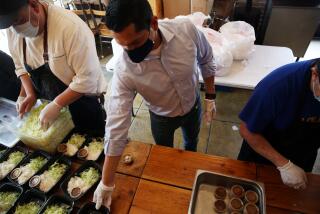The homeless on the holidays: Some food for thought
My church recently compiled a cookbook of favorite recipes from parishioners. I submitted my “recipes” for canned stew and chunky soup, mainstays of the dinners I ate at campgrounds while I was homeless for 6 1/2 years and living out of my truck and a tent. I wanted to remind people about those less fortunate and that cooking in a well-appointed kitchen is a luxury, not something to be taken for granted. But my submissions didn’t make the book.
A lot of people never think about how the poor live. There is plenty to eat in this country, and most of us never have to give the availability of food a second thought. This is especially true during the holiday season, when the biggest problem most Americans face is how not to overeat. But it’s good to put our blessings into perspective.
I’ve been both well off and poor. For 5 1/2 years when I was a child, I lived with my family in West German refugee camps for persons displaced by World War II. During that time, we ate rationed food given out by Allied occupying troops. Dinner was often some type of porridge and bread, or sometimes just soup. Lunch might be nothing but cottage cheese and bread, with which I would make a sandwich. But my late parents and I, who had fled Hungary, were glad just to be alive.
For a while, we and others kept a vegetable garden hidden in some woods near one of the camps. Once some other kids and I watched from a distance as Germans from a nearby village stole the vegetables we were growing, but we were afraid to stop them. That was the end of the garden.
No food was allowed to be taken from the mess halls run by troops, and the rule was strictly enforced. Once, when my uncle put his apple in his pocket to save for me for later, he was caught and sent to the brig for a day or two.
At times, my mother would sneak into farmers’ pastures at night to milk cows so I would have milk to drink. And once we went to a farmer’s house to buy a chicken for a very rare treat. The chicken was running around the farmer’s yard. The farmer got an ax, put the chicken on a tree stump and cut off its head. It ran around squirting blood until it died. My mother plucked the feathers and we had a chicken dinner, maybe the first one I ever had.
After we came to this country, we ate much better, but it took a few years. One Christmas season, when I was 8, a priest in our Montana town brought a sack of groceries to our house. That’s when I first realized we were poor. We often ate franks and beans, and our baths were in a donated horse trough in the kitchen. As my parents moved up in their hospital jobs, we moved to a better house, and on some Sundays we ate fried chicken at a restaurant. My mother took pride in the Hungarian desserts she would sometimes make, and one of her recipes made a local newspaper’s cookbook.
At the time I got married, I was very thin, but within a year I had added more weight than I wanted from my wife’s cooking. Eventually we ended up living on both the East and West coasts, where I worked as a journalist. We had two kids and a house in the suburbs, and later we moved to Montana, where we built a house overlooking a lake and also owned a cherry orchard a few miles away. During those 20 years of marriage we mostly ate traditional family fare, sometimes cooking from gourmet cookbooks. We prepared holiday feasts and ate at our share of good restaurants. I wouldn’t say I took the abundance for granted; I just never thought about it.
Years later, when I was single again, my writing and public relations consulting work fell way off because of the economy, and I became homeless. I had my truck and tent, and I put myself on waiting lists for senior housing while I Iived off the little work I did get and on my Social Security retirement payments once I became eligible. For years, I ate canned food and cereal at campgrounds, supplemented with dollar sandwiches at fast-food joints, mostly in the Southern California desert. It didn’t seem so bad; it was just necessary. At holidays, I sometimes went for a free meal for the poor at churches.
Today, sometimes to my consternation, I eat much better. For the last three years — now that I have an apartment with a kitchen — I have had to keep an eye on my weight. This Thanksgiving, I longed for a festive dinner at home while watching football, something I had enjoyed in my previous life. I cooked a turkey breast with all the trimmings and bought a pie. It was a lot of work for one person, especially the cleanup. Now, like many Americans, I’m dieting to take off the pounds I put on from eating too much during Thanksgiving week.
Soon Christmas will be here, and I will have to make a decision about what to eat for dinner, and whether eating exactly as I’d like is worth having to diet again afterward. Whatever I decide, I don’t want to forget the times when I was less fortunate and didn’t have that choice to make — some many pounds ago.
PREVIOUSLY:
Nov. 27, 2008: The start of the cold season
Jan. 28, 2009: A life comes out of storage
Les Gapay is a freelance writer living in Rancho Mirage. In 2008, he wrote for The Times about being homeless, and in 2009, about finding an apartment.
More to Read
A cure for the common opinion
Get thought-provoking perspectives with our weekly newsletter.
You may occasionally receive promotional content from the Los Angeles Times.






